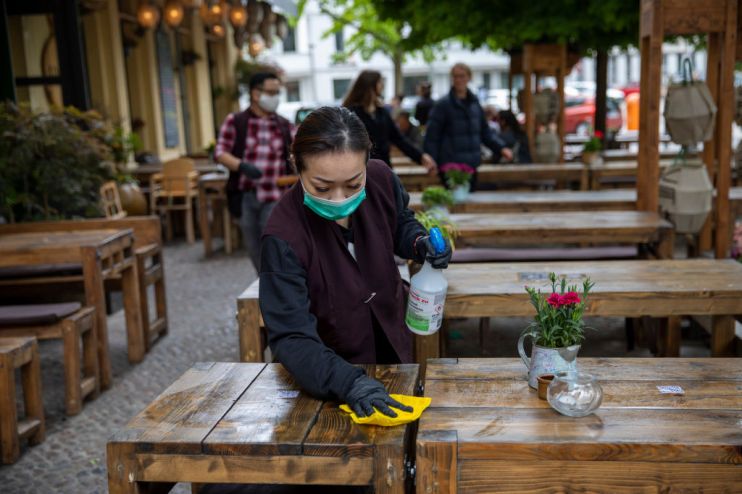A menu of options to keep our restaurants alive

You all know the image: a politician enjoying a pint or a meal at their local restaurant.
There are handshakes all round and a picture is posted on Twitter. It is — rightly — a scene that shows MPs or councillors backing businesses, particularly the small and medium sized enterprises which make up the lifeblood of the real economy.
It is an image, however, which risks being undermined by the harsh reality of coronavirus — and the government’s failing response to the pandemic.
The SMEs which are in ordinary times championed so heavily by politicians, and are trying desperately to get back on their feet after unprecendented disruption, are now being undermined by the piecemeal and problematic efforts of Boris Johnson, chancellor Rishi Sunak, and business secretary Alok Sharma.
Figures published on Tuesday and reported in City A.M., show how businesses have been let down. Companies have now borrowed £8.9bn through the flagship coronavirus business loan interruption scheme (CBILs) — but the approval rate is just 51 per cent, with many firms reporting that they still cannot access the cash they need.
The crisis is particularly acute in the sector in which I have spent my entire working life: restaurants and takeaways.
These firms have now been staring out at the world, from behind closed doors, for nearly three months. Of course, the lockdown was the right thing to do to protect the nation’s health — and I would argue it should have been initiated earlier in the crisis, as in other neighbouring countries. But the impact of shutting down normal life has been colossal.
There is now a real risk that thousands of the restaurants and takeaways beloved by Britons in every town may not even be in existence this time next year.
The industry is struggling to get the cash it needs. But with a few simple changes, ministers can help revive Britain’s world-famous and world-beating takeaway industry.
First, reform the CBILs programme, which offers loans of up to £5m to struggling companies with 80 per cent guaranteed by the government. The cabinet should demand that banks make the CBILS scheme as easy to access as “bounce back” loans, which have so far lent out £21.3bn. By contrast, nearly 46,000 firms have borrowed just £8.9bn through CBILS.
The government should also require the major lenders to cut the interest rate, which has been as high as eight per cent. This is not a sustainable rate for many SMEs which have seen their revenue streams slashed and may already have borrowed to invest in equipment, technology or training.
Second, the rules of furlough must be rewritten. Yes, the government did the right thing by setting up the scheme, which is now paying the wages of around eight million people. But last week’s announcement of summer changes to furlough — including the option of returning to work part-time — was a missed opportunity.
Unless the Prime Minister and chancellor promise targeted help for restaurants, pubs and takeaways, which will be unable to return to business as usual for months, the winding down of the furlough scheme could produce a tidal wave of job losses.
Third, I want to see support to help SMEs cope with the cost of commercial rents. This is particularly important in London, where property costs are one of the largest overheads borne by a restaurant, alongside staff wages.
Fourth, the government can and should provide tax breaks to support capital investment for the sectors which are hardest hit. It is this type of reform, in the depths of a crisis, that will pave the way for recovery across the economy. For restaurants, for example, it will not only benefit the businesses themselves but the staff they employ and the supply chains on which they rely.
Finally, why not provide SMEs with a refund for their last three years of corporation tax? This would provide a helping hand for businesses which were sustainable and profitable before the onset of the coronavirus crisis, but are struggling now.
We all know the return to any kind normality will take not mere months but potentially years. It will depend on consumer confidence, which will return gradually. We must ensure that businesses have adequate support to bridge the gap.
As a dining entrepreneur, I hope this menu of options will power our pubs, eateries and takeaways to recovery and pave the way for the return of politicians’ pictures in packed-out restaurants.
Main image credit: Getty